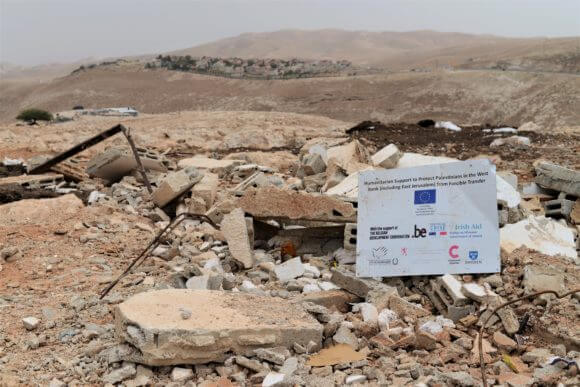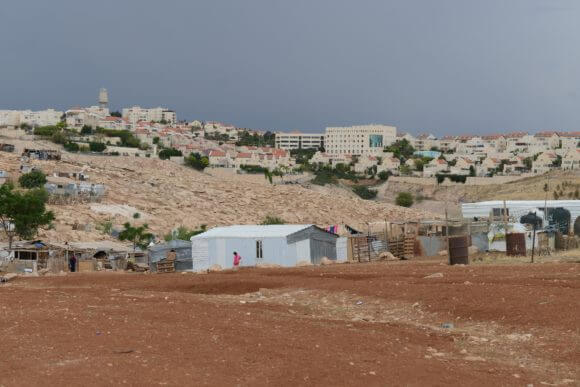Two young girls are walking through Abu Nuwar’s rocky and exposed terrain, near a defeated-looking donkey and tattered structures with metal roofs. Spotting me, they ask who I am looking for and give me directions for how to find Abu Imad, a community spokesperson for the Palestinian Bedouin village in the West Bank.
As if sensing the purpose of my visit, one of proudly informs me that she has good grades at school. It is recent news of this school that has brought me back to Abu Nuwar, three years after I first visited. As I get closer to the community centre, which now doubles up as a makeshift classroom, the girls yell to “go straight, keep on going!”


A demolition saga
A wave of demolitions began on 6 January 2016, when five homes, one animal shelter and five toilets were destroyed following “stop work” orders in August 2015 and a subsequent court appeal. Twenty-five people were made homeless that day and lost all of their belongings.
In February the same year, the community decided to build a school for third and fourth grade students, so that children aged between seven to nine years old no longer had to make a 2.5-mile round trip to school in nearby al-Eizariya. The French consulate in Jerusalem donated seven caravans to be used as classrooms.
The caravans were assembled next to the village’s existing kindergarten and elementary school by members of the community and European activists on 20 February. Hours later, at 2am on 21 February, soldiers arrived, declared the area a “closed military zone” and demolished the structures.
Over the next 18 months, Israeli authorities repeatedly confiscated tents used as temporary classrooms, solar panels that provided electricity for the school and demolished newly built school buildings.
In September 2017, the community attempted to prove their ownership of the land that Palestinian owners from the town of Abu Dis had sold them to build the school. They bought a license from Israel’s Civil Administration (ICA) for the land and a building permit that cost $220 (800 NIS) for the construction of two classrooms, funded by the European Union and EU member states.
On 13 December 2017, villagers found a demolition order document in the fourth grade classroom, stating the administration’s intention to demolish it. On 4 February 2018, the ICA came with their workers and the military to flatten the school buildings that had served 26 students.
It was the sixth time that the classrooms had been confiscated or demolished in two years.
Besides the kindergarten now lies a pile of rubble. The only marker of what used to be there is an intact donor sign with the words: “Humanitarian support to protect Palestinians in the West Bank (including East Jerusalem) from forcible transfer.”
In a statement released after the demolitions, the European Union Representative and the EU Heads of Mission in Jerusalem and Ramallah called on Israeli authorities to “rebuild the school structures in the same place,” while condemning the demolitions of Palestinian property, settlement construction and the designating of land for exclusive Israeli use, without any mention of punitive action.
The kindergarten, also EU-funded, may no longer smell of fresh paint with chairs still wrapped in plastic as I remember, but it is still standing, and is safe – for now. The community has a court order protecting it from demolition.

The school and the salon
The Israeli Civil Administration justified the latest demolitions by saying that the school was an “unsafe place” for students, says Abu Imad, as we sit drinking tea in the community centre.
Since then, third grade classes have been held in the village’s community centre and a men’s barbershop, or salon, complete with a large mirror, hair products and barber’s chair, is doubling up as a space to teach fourth grade students.
The salon squeezes in 10 or 11 children and six desks in the mornings. In the afternoons, the desks are taken outside and normal barber service resumes. The two young barbers assure me that the school isn’t affecting trade but despite such cheap prices – five Shekels (around a dollar) – for a haircut, there appear to be few customers.
I am struck by how quiet Abu Nuwar is this time, apart from the odd shepherd, everyone seems to be indoors. But, as I lift my camera to take a photo of Kedar settlement, I see 16-year-old Mariam (who asked for her last name not to be published) clearing the area outside her family’s home.
Mariam, a student at the high school in al-Jabal, tells me in broken English about her family; some are sleeping inside, she says. When I ask her what she thinks about the recent demolitions, she tells me that it is now “normal” for her, but she is worried about the future of Abu Nuwar.
“Soldiers coming to the village make a trauma for the children. And everyone knows that Israel wants us gone from here, I don’t know what will happen,” she says.

Bribes for work permits
Abu Nuwar is the largest Bedouin community in the Jerusalem area; 113 families and 650 people make it their home. But the community is surrounded by two illegal Israeli settlements – Ma’ale Adumim and Kedar.
Abu Nuwar is situated in Area C and is in E1 territory: an Israeli Civil Administration development plan approved in 1999 that seeks to divide the West Bank into two by connecting Ma’ale Adumim settlement to Jerusalem through a settlement corridor and accompanying separation wall building. Attempts to uproot 46 Bedouin communities that stand in the way are relentless.
If successful, the project will result in the forcible transfer of 2,500 Bedouin Palestinians into the town of al-Jabal, situated next to a large garbage heap and the annexation of large chunks of Palestinian land.
Unable to buy and sell sheep, wool or meat in Jerusalem and prevented from letting their flocks roam far has resulted in the number of sheep in the village falling from 15,000 in 2008 to 3,000 today.
Now the “lucky” members of the village are those who get permits to work in Jerusalem, usually as construction workers. Israeli authorities use the issuing and revoking of permits as a tool of coercion in Abu Nuwar.
The Civil Administration confiscated Ahmad Ibrahim’s work permit over five years ago because he was politically active.
“I would welcome visitors and tell them what’s going on,” remembers the father of twelve, who has not found work since.
“They [Israeli authorities] do this so people are scared. Because of this, sometimes you can come to Abu Nuwar finding nobody to welcome you.”
Other people have lost their work permits for helping to build the classrooms, with one told that he would get his permit back if he left the village, says Ahmad, who was punished for connecting the school with electricity from his home.
“When the Civil Administration came, they followed the electricity cable and found that it led to my house. When the classrooms were demolished in February, the cable was cut in five different places so that it couldn’t be connected again.”
The bus
There is disappointment among residents in Abu Nuwar at the lack of support from the Palestinian leadership and the Palestinian population.
While the Palestinian Authority gives the community humanitarian aid, tents and has provided teachers for the school, they have not facilitated alternative job opportunities for people who can no longer work as shepherds.
Meanwhile, Israel’s long-term strategy to drive out Palestinian communities from E1 in the form of property demolitions, settlement expansion and lack of freedom of movement continues apace.
“For three years the civil administration has been pressuring us from different sides, trying to make us leave, even offering us money. We didn’t even open the door to ask how much but they seem to be ready to pay anything,” says Abu Imad, wearing a traditional white robe.
To resist the demolitions and the constant harassment by the Israeli authorities, residents are searching for a strategy of their own.
“We are not going to keep building and having demolitions whether the money comes from me or the European Union,” adds the village leader, resolutely.
One idea the community is considering, EU-funding dependent, is for a bus to take the children to nearby schools. They hope it will be at lower risk of confiscation and therefore a more sustainable solution.
Mariam agrees there needs to be a change of tactic, starting with more coordination between communities: “We build, or we don’t build, either way, they [the Israeli authorities], take our money and our dreams. Together we need to find a new way to stay here.”


